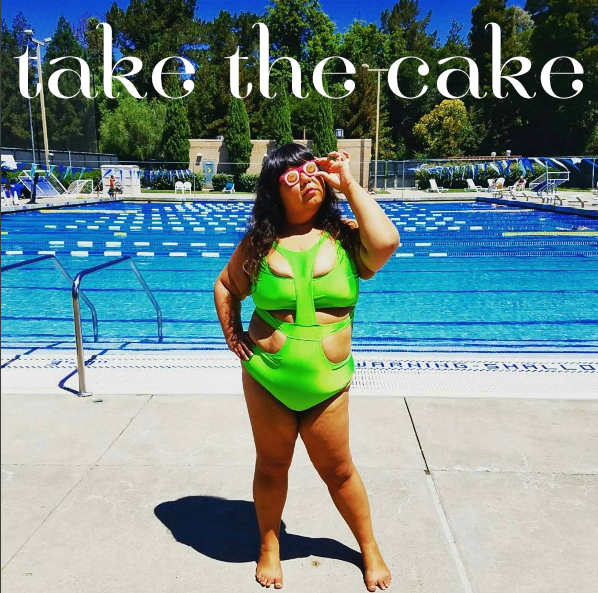
On Saturday morning I woke up at 8:30.
This was real unpleasant, especially because lately, every morning looks like a fog monster has swallowed up all my dreams, goals, and faith that my future will be a bright one.
Jacob rolled over and offered to get out of bed to join the caffeine-withdrawn masses waiting in line at Andytown Coffee Roasters. This is a San Francisco ritual that characterizes almost all food/beverage acquisition regardless of the weather or the hour. He tells me to sleep in while he hunt-gathers coffee and a scone so I can have breakfast in bed.
I am up early because it's Babecamp season and from 10 to 11 am, I do my weekly group call with all the burgeoning babe-lets. They call in from all over the world, Portland to Berlin.
This week we have been talking about self-loathing and the ways that diet culture keeps us embroiled in a war against ourselves.
Fast-forward. I have reluctantly woken up, am full of scone and espresso, and have already had a full political discussion before the call even begins.
Once we’re in the teleconference, I tell them stories and share insights on just how awful fatphobia is.
One of the women shares that she is grateful to be learning so much, but is also massively overwhelmed by imagining what her life will look like once dieting is in her rearview mirror. She talks about feeling like she is “free-falling.”
I know that feeling. Very well.
It is this sense that the ground you are standing on has stopped feeling solid, and it feels more like you are standing in a milkshake that is quickly melting. Except without any of the pleasantness that living in a milkshake sounds like it could create.
Dieting isn’t just a practice; it’s a way of life. What do we do when we don’t have any more calories to count and we have to deal with the wide-open space left in their wake?
This is the feeling that many feminists and rabble-rousers and activists and weirdos and anti-assimilationists feel throughout our lives (especially when we first start on our path) — the awareness that we are ready to opt out, but that there is no clear path from here on out.
It is scary to walk out the door and not know where you are headed.
With fewer strictures we are forced to do the work of choosing, which can feel overwhelming and, honestly, might even lead to us feeling confused or unhappy at times. With great cheesecake comes great responsibility, girl.
Some of my biggest moments happened before I even knew I was radically altering the course of my life. I came into feminism at an early-ish age: 20. Almost all my friends were anti-racists and queers and anti-racist queers, and being a fat lady who loved sex and tight clothes made me an almost-automatic member of The Militant And Downtrodden.
I loved it. It admittedly felt less scary because at that point in my life, I was living off of, like, frozen burritos and financial aid.
I had a bedroom all to myself in an old Victorian at Oxford and Vine in Berkeley's Gourmet Ghetto. I wasn't afraid of most of the stuff that keeps people from defecting from social expectations.
No kids. No mortgage. No spouse. Just lots and lots of curiosity about how to Fuck. Shit. Up.
But I was still dieting. I was still convinced that I had to starve myself to be anything approaching human. I still didn't see my calorie-counting as incompatible with my feminism.
In short, even though I had already undergone a pretty thorough political education, my daily life was still dictated by the number on my scale.
Paradoxically, being vociferous about masturbation or the American history of genocide were way more socially acceptable than my choice to stop dieting.
Letting go of the dream of thinness is one thing. Really recognizing that we live in a culture that promotes injustice, self-harm and the diminished lives of women — and REFUSING to play along — is quite another.
I think the babe on the call was expressing a sense of alienation that can sometimes accompany our political educations. Seeing privilege and the injustice that maintains it is, for many, a willful act.
When we choose to pull back the veil, we are changed by the knowledge of what we have seen. Living in a way that honors justice and authenticity is an act of maturity and humanity in a culture that doesn’t promote either.
But I think free-falling has a lot to offer us.
What being normcore offers us is the pre-existing knowledge that every single one of us should be happily married with a happy baby in a home we keep effortlessly pristine.
We even know what we are going to wear every day: yoga pants.
When you’re not on the straight and narrow, it’s like someone has taken the prix fixe menu away from you and replaced it with one of those food-novels from The Cheesecake Factory.
With fewer strictures we are forced to do the work of choosing, which can feel overwhelming and, honestly, might even lead to us feeling confused or unhappy at times. With great cheesecake comes great responsibility, girl.
Living autonomously is a little like free-falling, no doubt.
But it’s important to remember that not knowing the outcome is the best part of any story.







